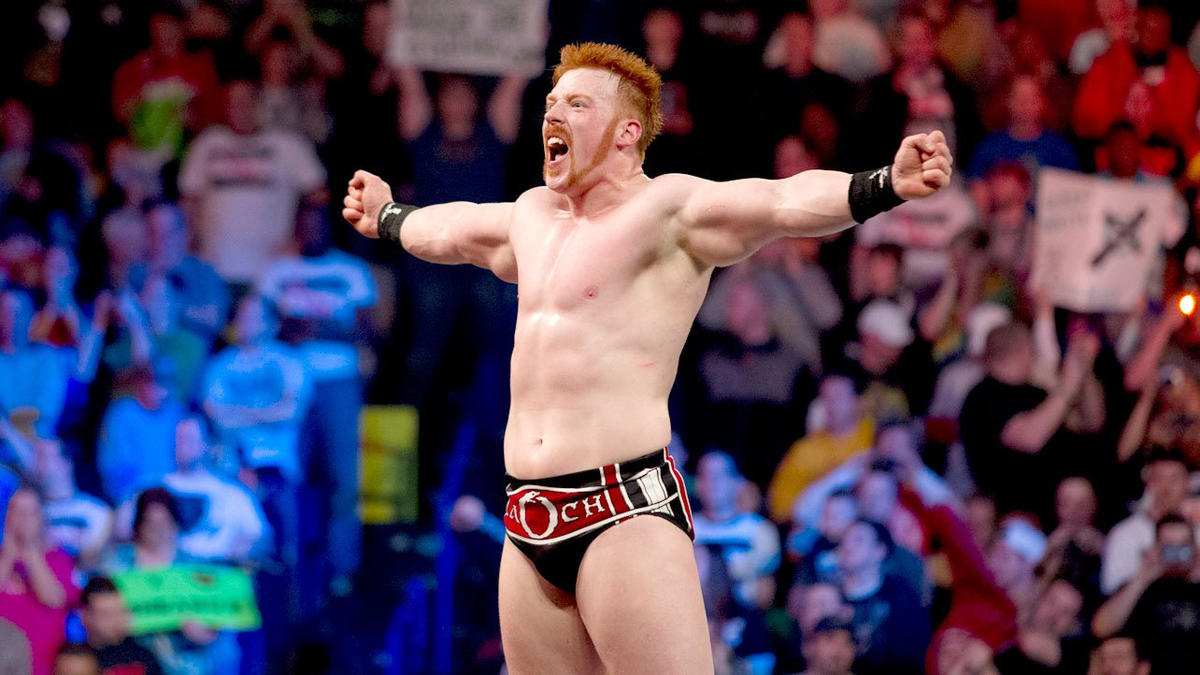Of course, until 1993, the winner of the Royal Rumble wasn’t guaranteed to main-event Wrestlemania. However, 2012’s Royal Rumble was the first in history where the winner was guaranteed not to main-event Wrestlemania. The headlining match of Wrestlemania 28 having already been set as John Cena vs. The Rock a year earlier, the best a Rumble winner could wish for was a semi-main event spot at the biggest event of the year.
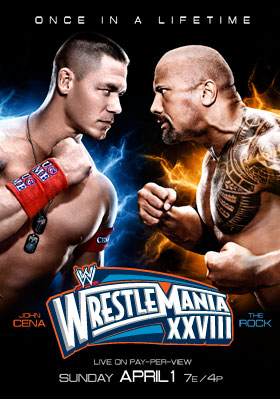
So how could the WWE generate interest in the least meaningful Royal Rumble in decades? With a tantalizing stipulation.
See, this would supposedly be the first Royal Rumble in history where every superstar was eligible to enter. And since, traditionally, champions and wrestlers on the evening’s undercard don’t enter the Rumble match, this new rule would presumably mean that the world champions were eligible to enter (which hadn’t happened since 1991, the last time there was no prize for winning). Would this be the year that the two world titles would finally be unified, with one champion winning the Rumble and challenging for the other title at Wrestlemania?
With Chris Jericho’s much-anticipated return to WWE, it looked like a Jericho win and a Best in the World vs. Best in the World match with CM Punk was a foregone conclusion, but the “every superstar is eligible” rule opened the door for some intriguing possibilities.
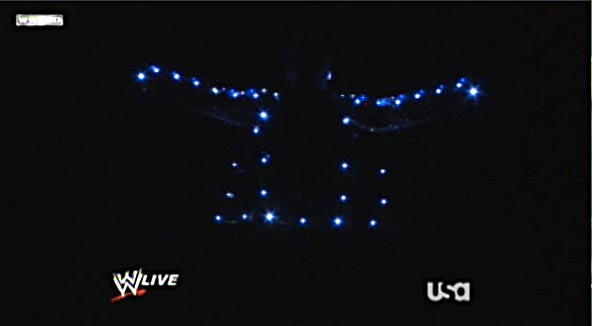
Anyone holding out hope for a CM Punk-Daniel Bryan Wrestlemania main event, though, was surely disappointed when the “anyone can enter” stipulation proved merely to be a setup for a sixty-minute joke — perhaps the stupidest joke of Vince McMahon’s not to involve poop.
The first person to exploit the “every WWE superstar is eligible” rule was a hefty Mick Foley. You might have noticed that Foley is not a WWE superstar, and strictly speaking has never been one, having retired in 2000, when the company was called the WWF.
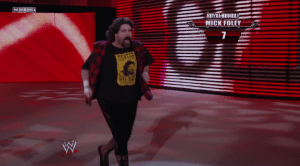
The very next entrant was teased to be the injured Alberto Del Río but was in fact his manager and personal ring announcer, Ricardo Rodriguez, who had never wrestled a match in WWE and was never presented as any sort of athlete, let alone a “superstar.” This harkened back to King of the Ring 1995, which saw Brian James, who had for months been presented as nothing but a roadie (as subtly hinted at by his ring name, “The Roadie”) not only enter the tournament but make it to the semifinals. At least Road Dogg wouldn’t be in this year’s Rumble, right?

Next out was Santino, who delivered a wedgie to Ricardo before eliminating him.
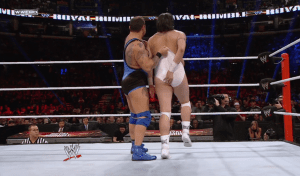
Fourteen years ealier, Mick Foley and Terry Funk had dueled, armed with a chair and a chainsaw, respectively.
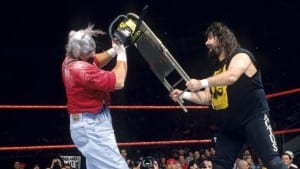
This year, Foley and Santino dueled, armed with a sock and a sock, respectively. Did I mention that if Foley never wrestled again for the rest of his life, this will have been his last match ever?
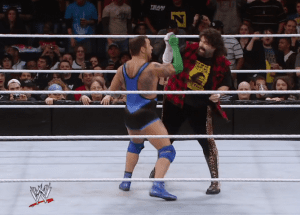
Just a few entrants later came Jerry Lawler, who interrupted his announcing duties to take care of business for about 30 seconds before being eliminated by Cody Rhodes. Sure, as an announcer, Jerry wasn’t officially a WWE Superstar™, but it was still a nice little gag. It was even nicer in 1997, when he did the exact same thing.
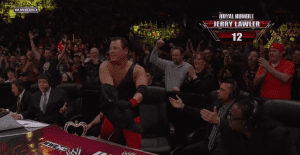
A brief respite from joke entries followed, but even these entrants were clearly not Wrestlemania-bound. For instance, there was Ezekiel Jackson, whose entry was celebrated with this “Purple Aki” sign, referring to the notorious black English bodybuilder with a muscle-touching fetish.
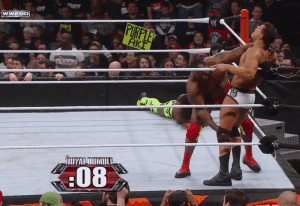
Jinder Mahal’s presence in the Rumble was marred by chants of “USA” at a point in the Rumble where the only babyfaces were Ghana’s Kofi Kingston and Guyana’s Ezekiel Jackson, who were soon joined by India’s Great Khali.
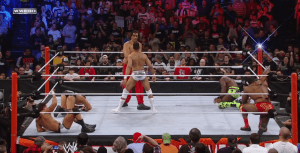
Business finally picked up when the #16 entrant was none other than the recently returned Demon Kane, who hoped to parlay the momentum gained by donning the mask again into a title match.
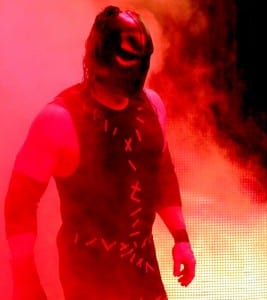
Kidding! Kane broke his string of 13 Royal Rumbles so he could wrestle John Cena to a double-countout on the undercard. This apparently kept him out of the Rumble match itself, despite the stipulation that explicitly stated that it was open to any superstar.
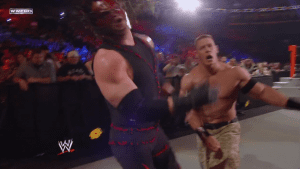
Instead of Kane (or John Cena, who already had bigger and better plans for Wrestlemania 28 than a lowly world title match), the #16 spot went to Hunico, the former Sin Cara Negro, was driven to the ring on a low-rider bicycle by the alleged Mexican Camacho, son of Haku.
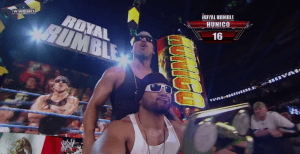
The seventeenth entrant was Booker T, the second member of the ringside announce team to enter the Rumble that night. Again, Booker T was an announcer, not a WWE Superstar™, so he still shouldn’t have been eligible, even under the new rule. The cameras cut to Booker just as he had torn off his warm-ups, making it look for all the world like he had been announcing all night without pants.
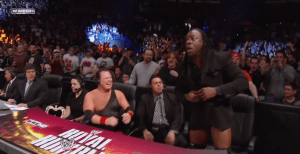
At this point, everyone watching realized with dread that the third man on the commentary team, Michael Cole, would inevitably enter as well to complete the “joke.” It is also at this point that I turned to my brother and said, “This isn’t a very good Rumble.”
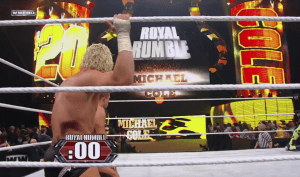
And it couldn’t have been, considering that of the first seventeen entrants, The Miz was the most likely to win it all.
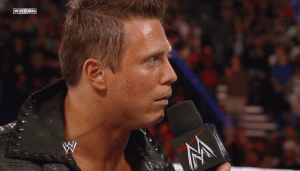
Kofi Kingston delivered the first of the Rumble’s numerous highlights (two counts as “numerous,” right?), this handstand to avoid elimination. The backstage interviewers really dropped the ball on this one, as no one asked Kofi if this Rumble looked any less silly upside down.
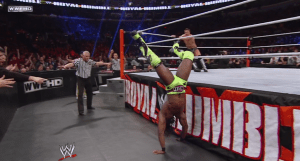
Hey, it does!
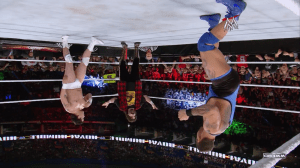
Next out was Dolph Ziggler, who, Cole explained, was allowed into the Royal Rumble match because he lost in his title match to CM Punk. Since supposedly any superstar could enter, shouldn’t that mean he could have competed even if he had won the title? Or would his spot have gone to CM Punk?
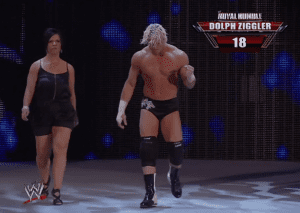
Sadly, Dolph would provide only a brief reprieve from the steady stream of joke entrants, as a very loose-skinned Hacksaw Jim Duggan made a surprise appearance for less than a minute, apparently trying out his new gimmick, “The Untalented Mr. Ripply.”
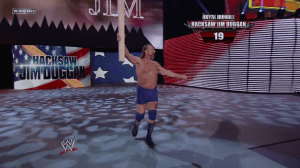
By now, the fans had been so numbed to goofy “surprises” that WWE might as well have filled the rest of the Rumble with Conquistadors.
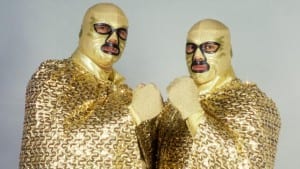
The inevitable Michael Cole entry took place next, with the play-by-play man donning his unsightly orange singlet. The bright side to all this was that, while Cole could offend the viewers’ eyes, as long as he was off commentary he couldn’t offend their ears… except his theme music was by Nickelback.
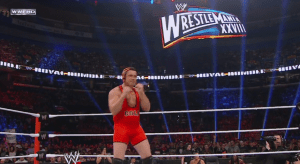
Cole, who could never be considered a “superstar” by any stretch of the imagination, danced around the ring for the remainder of the 90 seconds until Kharma’s music hit. At last, a cool surprise (even if Kharma was a Diva™ and not a Superstar™)! The former Awesome Kong, who had been off television since May, returned to clothesline Michael Cole, who then climbed over the top rope for some reason and pleaded with the 270-pound woman before his fellow announcers (and Rumble entrants) Booker and King pulled him off the apron, eliminating him but saving his hide.
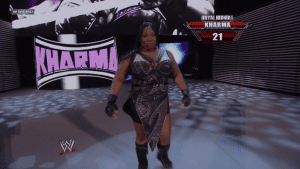
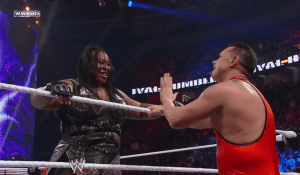
Cole then complained about his colleagues’ actions, claiming that the only reason he backed off from Kharma was because he “didn’t want to touch a woman.” I’m sure a lot of people have suspected that since he debuted with the company. (Heidenreich especially)
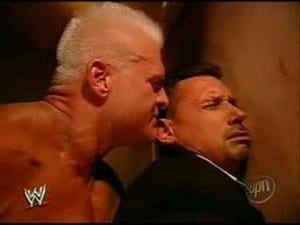
Kharma delivered the Implant Buster to Dolph Ziggler, who was not the ideal recipient of this move, but since the only entrant who appeared to have implants to bust was the already-eliminated Ezekiel Jackson, Ziggy would have to do.
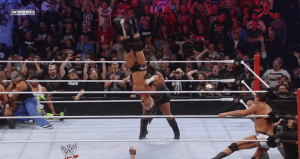
She then tossed Hunico over the top rope like he was nothing before being dumped out herself with great effort by Dolph Ziggler. Booker T was astounded by this, complimenting the heel without irony for doing “the impossible” – eliminating a woman.
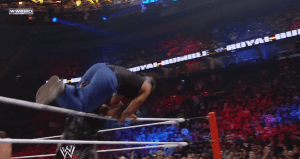
Unfortunately for everyone, Kharma never did return full time to WWE, making this her only match with the company. Hindsight being 20/20, they probably shouldn’t have had her eliminate a male superstar on the main roster.
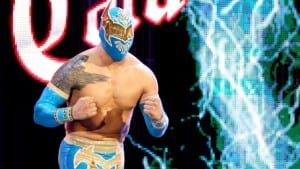
But if they wanted to make her look strong, what were they supposed to do? Have her toss a non-wrestler out? It’s not like Vince could have very well done something stupid like put Michael Cole into the match.
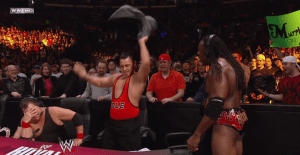
Sheamus entered at #22 and quickly eliminated Kofi Kingston, drawing boos. Sheamus was a babyface here, and this would be just the first of oddly heelish actions he’d be scripted to perform, such as gloating over his quick win against Daniel Bryan or kicking a referee’s head off.
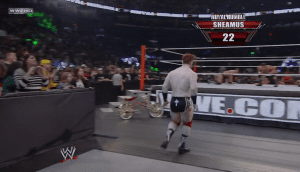
At least Sheamus was a former world champion, though. So finally, in the last third of the Rumble match, it looked almost as if it were time to get serious, but you and I both knew that wouldn’t the case.
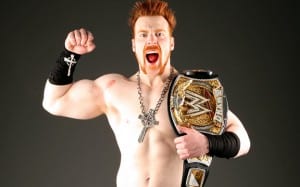
Oh, you didn’t know?
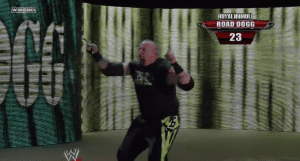
Okay, so Road Dogg did make it into this year’s Rumble after all. But at least he’d never get a another run with the tag team titles, right?
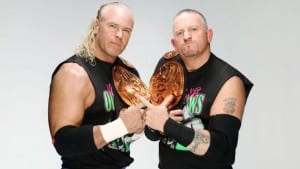
A few dance moves moves later and Road Dogg earned (well, “received,” anyway) a “You still got it” chant.
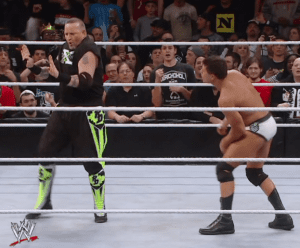
Jey Uso was out next, accompanied by his twin brother Jimmy, who was dressed for the big match in a sweater vest. See, for some odd reason, there was only enough room in the field of 30 for one of the Usos in this year’s Rumble. I wonder how that could have happened?
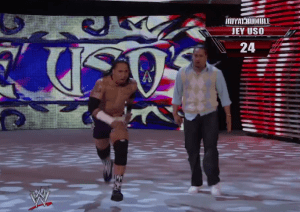
Jack Swagger came in at #25 and, in a damning indictment of this year’s Rumble roster, became one of the favorites to win the whole thing. Swagger held the US title at the time, having beaten fan favorite Zack Ryder, who would not appear in the Rumble due to selling the broken back he suffered when Creative kicked his legs out from under him.
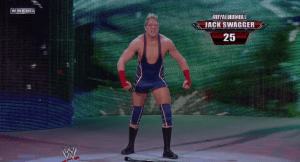
Wade Barrett entered at #26 wearing a jacket like Goro on prom night.
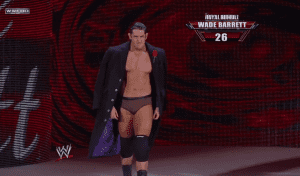
With only four more entrants remaining and no clear winner in sight, it looked like it was Hail Mary time for WWE to bring in some mega-surprise to shake up the Rumble, especially at the #27 spot, the position historically most likely to win the match. So naturally, they threw Jennifer Hudson’s husband in there.
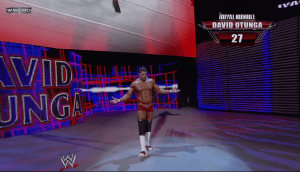
Randy Orton arrived at #28 to bring much-needed star power and eliminate The Uso, followed by Wade Barrett.
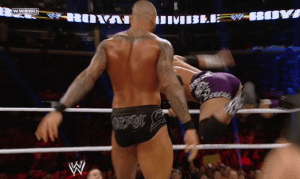
At last, the odds-on favorite Chris Jericho entered, eliminating Clarence Mason 2.0.
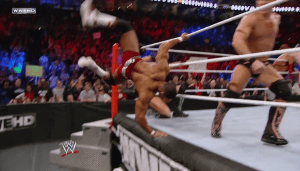
Rounding out the underwhelming field of competitors was the Big Show, who had lost his World title match earlier in the night. Not in the Rumble match was the World’s Strongest Man, Mark Henry, who also lost to Daniel Bryan in the Triple Threat cage match. In fairness, to include the recent World champion would have meant bumping Road Dogg or Jim Duggan out of the match.
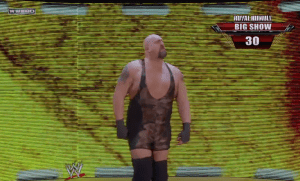
And that was it for the Rumble entrants. All in all, there were 3 retirees, 3 commentators, 1 ring announcer, 1 woman in the match, and 0 permanent returnees. That’s over 25% of all spots taken up by basically throwaways, averaging under 3 minutes in the ring each. Wouldn’t all these people have been better suited for the 2011 Royal Rumble, where there were 40 entrants?
Worse yet, even as a punchline, the constant barrage of novelty entrants fails. After all, the rules stated that “every WWE Superstar™” was eligible to enter the Rumble. It didn’t say, “every person ever affiliated with WWE.” WWE thought it was doing the equivalent of the joke, “What time is it when an elephant sits on your fence? Time to get a new fence!” Instead, it made the equivalent of this joke: “What time is it when a bird sits on your fence? Time to get a new fence! Oh, and instead of bird, I meant to say ‘any animal, including an elephant.'”
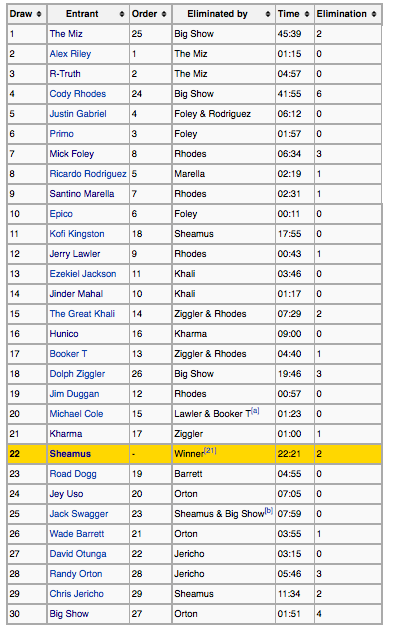
People hold up 1995’s Royal Rumble field of 30 as the gold (or pyrite) standard of bad rosters, but can you imagine if they had thrown in Dick Murdoch, Shinja, Gorilla Monsoon, Vince McMahon, George Steele, Todd Pettengill, Bull Nakano, and the Honky Tonk Man in there?
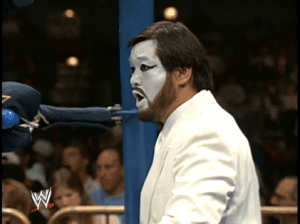
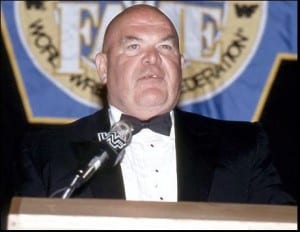
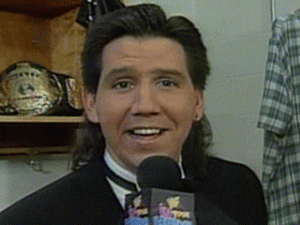
Okay, so they did put Murdoch in there, and Bull Nakano would have made that Rumble ten times better, but you get the point.
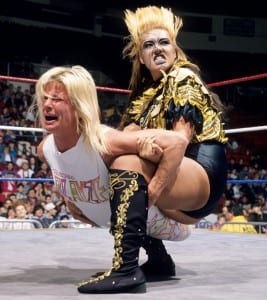
Show made an immediate impact by eliminating Jack Swagger, then doing his best George McFly impression by knocking out Biff with one punch and sending him spinning to the ground.
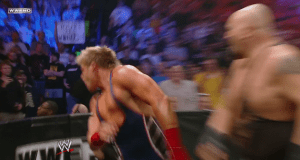
Show then promptly eliminated the other remaining heels, and with only babyfaces remaining, Jericho had the most support from the fans, including that guy who’d say “Wow” when Brock Lesnar ended the Streak. And considering that neither Show nor Sheamus had any momentum to speak of, and that Orton was being kept out of the title picture due to his two Wellness strikes, it seemed that Y2J had the Rumble locked up.
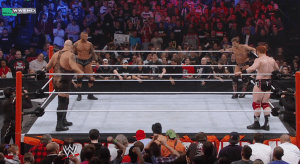
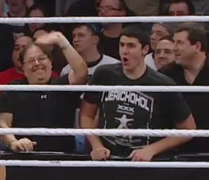
Randy and Show went out in quick succession, meaning the fans could sit back and watch Jericho eject Sheamus and face CM Punk in the obvious Best in the World vs. Best in the World at What I Do match at Mania 28.
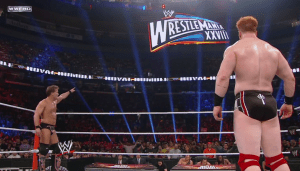
(Also of note is that, of the nine WWE employees in this picture, five of them were Rumble entrants this year. Not involved were Mike Chioda, Carlos Cabrera, Marcelo Rodriguez, and that cable-runner. His spot was taken at the last minute by Hunico, I hear)
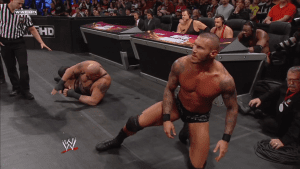
It all seemed so academic. Sure, there were a few times that it looked like Jericho could be tossed over, but Sheamus would then show symptoms of Rumbleitis, forgetting that to eliminate someone, you had to push them out of the ring, not pull them back in.
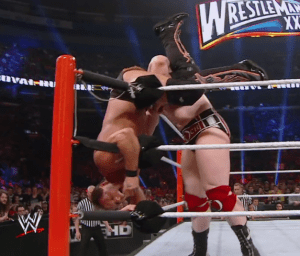
Instead of Jericho triumphing, though, fans got mildly swerved when Sheamus kicked the spit (not a typo) out of Y2J to win the Rumble. It was enough to make the viewers politely scratch their heads and say, “Oh, huh. How about that.”
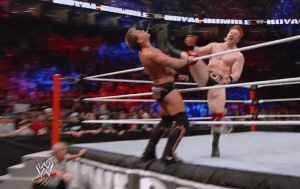
If the “Just Say Yes” guy had been in the front row that night, this would have been his reaction.
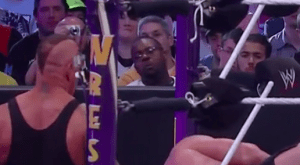
Perhaps Sheamus’s victory would have meant more had he triumphed over the WWE’s 29 best superstars, rather than the oddest collection of misfits since the APA Barroom Invitational.
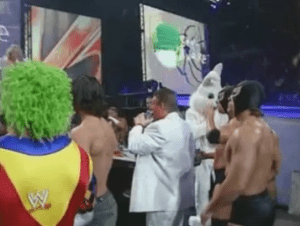
Scarcely anything that happened in this Rumble ended up having any consequence in storyline — not even who won.
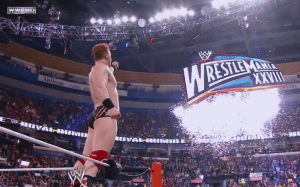
Once Jericho started feuding with Punk in the following weeks, his Rumble loss came to mean zilch, as it became obvious that he would carry on that tradition of Rumble runners-up…
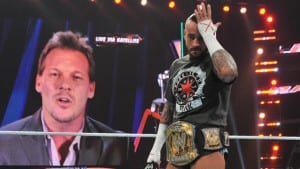
…like John Cena (2005, 2010)…
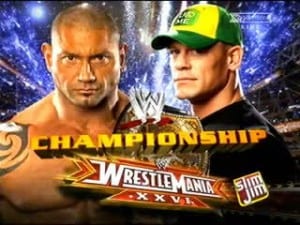
…Randy Orton (2006)…
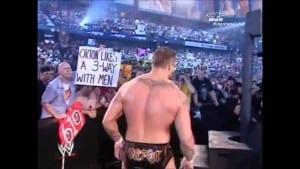
…Triple H (2006, 2008, 2009)…
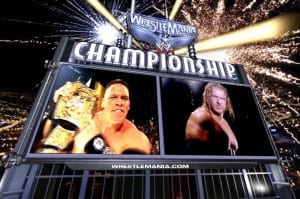
…and Shawn Michaels (2007) by wrestling in a world title match at Wrestlemania anyway, usually higher up on the card than the actual Rumble winner.
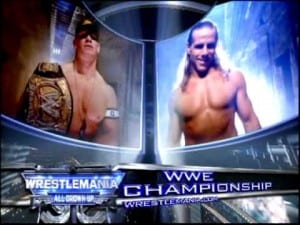
On the other hand, Sheamus’s win, it turned out, was just an excuse to make a World title match without having to write an angle for it.
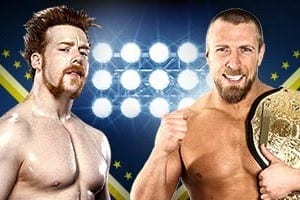
And as for that “main event” match that Sheamus supposedly earned? It opened the show and lasted all of 18 seconds to make room for the matches on the card deemed more important (i.e. all of them).

